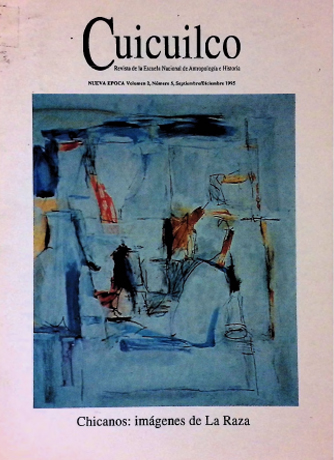Dossier
Published 2023-11-09
Keywords
- Antropología,
- México,
- Chicanos,
- Cultura,
- Siglo XX
Copyright (c) 1995 Instituto Nacional de Antropología e Historia

This work is licensed under a Creative Commons Attribution-NonCommercial 4.0 International License.
How to Cite
México y lo mexicano en Aztlán: el pueblo chicano y la cultura mexicana, 1900-1940. (2023). Cuicuilco Revista De Ciencias Antropológicas, 2(5), 67-82. https://revistas.inah.gob.mx/index.php/cuicuilco/article/view/20121
Abstract
-
Downloads
Download data is not yet available.
References
- Juan Gómez Quiñones, «Notes on an Interpretation of the Relations Between the Mexican Community in the United States and México» en Carlos Vásquez y Manuel García y Griego(eds.), Mexico-U.S. Relations. Conflict and Convergence, Los Angeles, California, 1983, pp. 417-440.
- Juan Gómez Quiñones y David R. Maciel, Al norte del río Bravo. Pasado lejano, México, 1981, pp. 107-110, 169, 213.
- Arthur F. Corwin, «Quién sabe. Mexican Migration Statistics» in Arthur F. Corwin (ed.), Immigrants and Immigrants, Wesport, 1978, pp. 108-136.
- Moisés Ochoa Campos, La Revolución Mexicana, volumen. 1, México, 1966, p. 23.
- José Luis Ceceña, México en la órbita imperial, México, 1976.
- Rodney D. Anderson, Outcasts in their Own Land. Mexican Industrial Workers, 1906-1911, Dekalb, Illinois, 1976, pp. 32-38.
- Carey McWilliams, Northfrorn México, Nueva York; y W. Eugene Hollen, The Southwest Oíd and New, Lincoln, 1968.
- Mark Reisler, By the Sweat of their Brow: Mexican Immigrant Labor in the United States, 1900-1940, Westport, Connecticut, 1976, p. 20.
- Paul S. Taylor, Mexican Labor in the United States, volumen 1, Nueva York, 1970, p. 320.
- John M. Hart, Revolutionary México, Austin, 1989; y el trabajo, dos volúmenes, de Ochoa Campos, La Revolución Mexicana.
- Lawrence A. Cardoso, Mexican Eniigration to the United States 1897-1931, Tucson, 1980, p. 45.
- David R. Maciel, «The Unwritten Alliance: Mexican Policy on Emigration to the United States» en The World and I: A Chronicle of Our Changing Tintes , 7, 1986, pp. 677-699.
- Ricardo Romo, «The Urbanization of Southwestern Chicanos in the Early Twentieth Century» en New Direction in Chicano Scholarship, Richard Romo y Raymond Paredes (eds.) La Jolla California 1978, pp. 193.
- Eric E. Lampará, «Urbanization and Social Change: on Broadening the Scope and Relevance of Urban History» en Oscar Handlin y John Burchard (eds.), The Historians and the City, Cambridge, 1963, pp. 225-247.
- D. W. Meining, Southwest: Three Peoples in Geographical Change 1600-1970, Nueva York, 1971, p. 72.
- Ricardo Romo, «The Urbanization of Southwestern Chicanos in the Early 2Oth Century» en Ricardo Romo y Raymond Paredes (eds.), New Scholar, VI, 1977, p. 185.
- Rodolfo Acuña, Occupied America: A History of Chicanos, Nueva York, 1981, p. 85.
- Nicolás Kanellos, Hispanic Theater in the United States, Houston, 1984, p. 17.
- James Gilbert, A Field Study in México of Mexican Repatriation Movement, tesis de maestría sin publicar, Universidad del Sur de California, Los Angeles, 1934.
- Francisco E. Balderrama, In Defense of La Raza, Tucson, 1982, pp. 15-31.
- Nicolás Kanellos (ed.), Híspante Theater in the United States, Houston, 1984, p. 19.
- F. Antonio Rosales, «Spanish Language Theater an Early Mexican Emigration» en Nicolás Kanellos, op. cit., pp. 15-24.
- Nicolás Kanellos, A Hislory of Híspante Theater in the United States: Origins to 1940, Texas: 1990, p. 18.
- Nicolás Kanellos, Mexican American Theater Then and Now, Houston, 1983, p. 29.
- Shifra M. Goldman y Tomás Ybarra-Frausto, Arte chicano, Berkeley, 1985, p. 30.
- Kanellos, «Teatro mexicano en Estados Unidos» en Ida Rodríguez Prampolini (ed.), A través de la frontera, México, 1985, pp.
- Tomás Ybarra-Frausto, «Chata nolaesca: figura del donaire» en Kanellos (ed.), Mexican American Theater Then and Now, Houston, 1983, pp. 41-5 1.
- Eva Sperling Cockroft, «From Barrio to Mainstream- the Panorama of Latín Art» en Francisco Lomelí (ed.), Handbook of Hisvanic Cultures in the U.S.- Literature and Art, Houston, 1993, pp. 192-217.
- Tomás Ybarra-Frausto, «Introducción a la historia del arte mexicano-norteamericano» en A través de la frontera , pp. 56-58.
- Jacinto Quirarte, «Mexico's influence on U. S. Art» en Chicano Art History: A Book ofSelected Keadings, editado por Jacinto Quirarte, San Antonio, 1984, p. 49.
- Orlando S. Suárez, Inventario del muralistno mexicano, México, D. F., 1972, pp. 27-37.
- Jacinto Quirarte, Mexican American Artists, Austin, 1973, pp. 53-57.
- David Maciel y María Rosa García, «El México de afuera: políticas mexicanos de protección» en Revista mexicana de política exterior, 3:12 Julio-septiembre, 1986, pp. 1432.
- Quitarte, Mexican and Mexican American Artists, p. 68.
- Elizabeth C. Ramírez, Footlights Across the Border, Nueva York, 1980, pp. 128-129.
- José M. Sánchez García, «Teatros que en EUA, exhiben material extranjero» en Cinema Repórter, edición especial, México, enero de 1940, pp. 94, 95,100.
- David R. Maciel, «El auge del cine mexicano en Estados Unidos», inédito 1994.
- Entrevista con José Ruiz, El Paso, Texas, junio 14 de 1993. Véase también Alex Saragoza, “Mexican Cinema m the United States, 1940-1952» en Mario T. García et al., History Culture and Society, Ypsilanti, 1983, pp. 107-125.
- Entrevista con Gilberto Martínez Solares, ciudad de México, junio 12,1994.
- David P. Maciel, El bandolero el pocho y la raza: imágenes cinematográficas del chicano, México, 1994.

